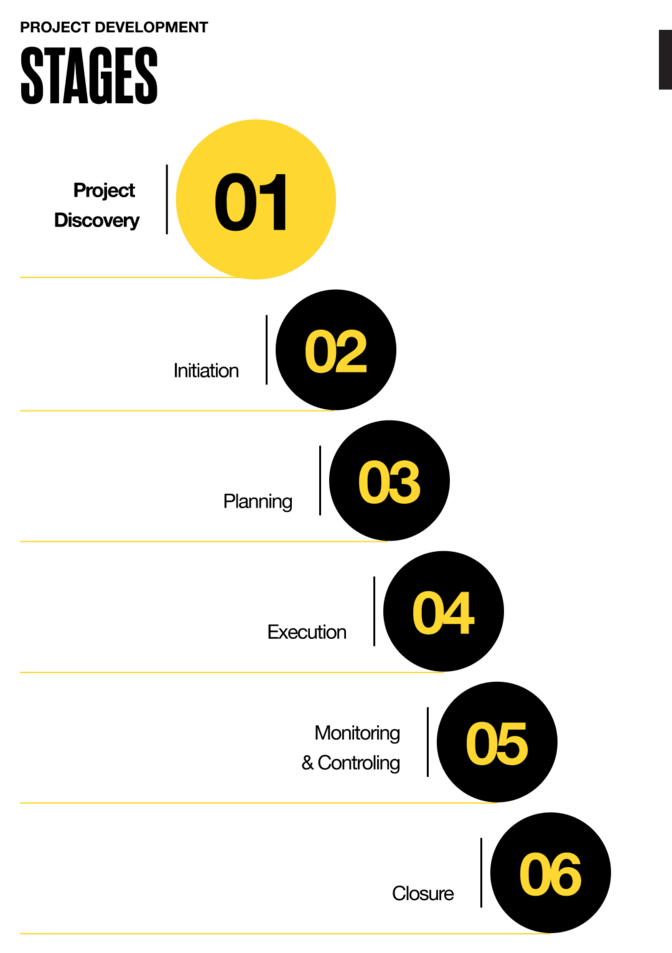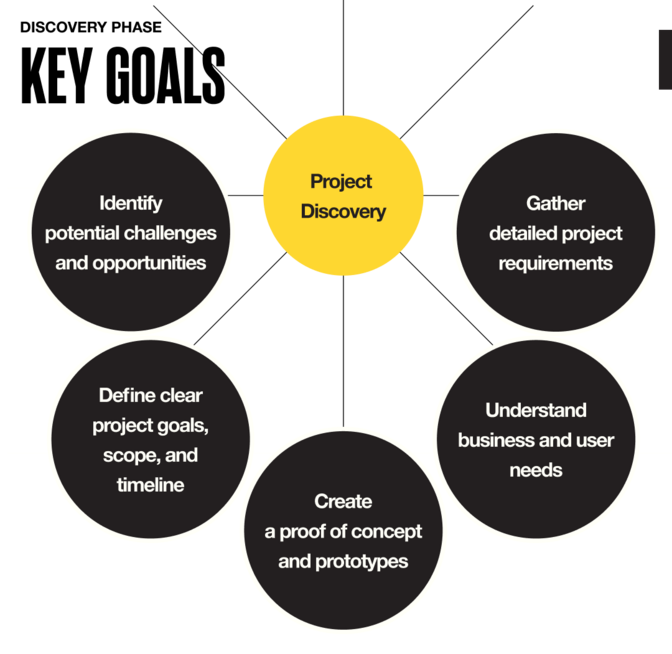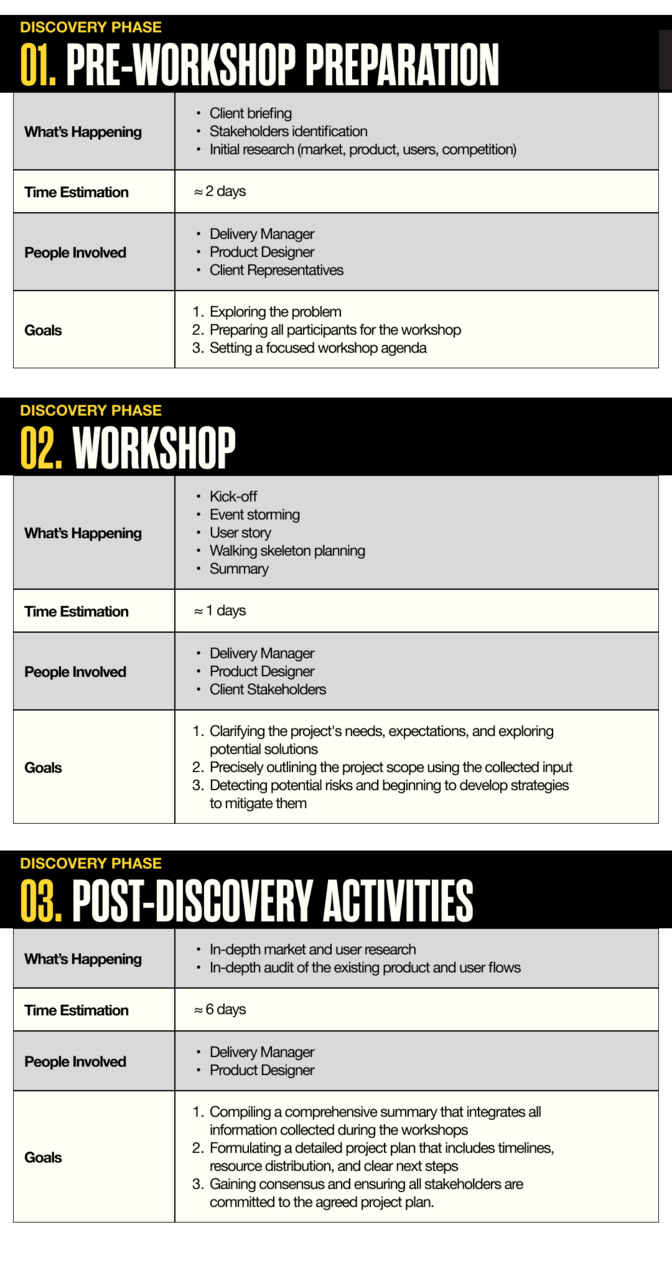Why Do You Need the Discovery Phase in E-Commerce Projects?
A well-planned discovery phase can make the difference between an e-commerce project's success and failure. Learn how mastering this initial step can mitigate risks and maximize value in your e-commerce initiatives.
Various studies show that only about 10% to 30% of IT projects succeed globally. McKinsey's research further highlights that 45% of software development projects exceed their initial budget while delivering 56% less value than predicted.
These issues often result from unforeseen challenges that could have been identified early on. A well-executed discovery phase can address these problems by uncovering potential obstacles and planning effective mitigation strategies.
What Is the Project Discovery Phase?
The project discovery phase, also known as requirement analysis or scoping phase, is the initial stage of the software development process. It seeks to gain a deep understanding of business, industry, and competitors. The discovery phase aims to gather requirements, define project goals, and understand the scope for both you and your tech partner. You may think of it as a bridge between the theoretical concept and practical, technical execution.

During this phase, stakeholders engage in comprehensive discussions to align their visions and expectations. The goal is for all parties to mutually understand the project's challenges and objectives.
The project discovery phase is indispensable in setting the right course for software development projects. It guarantees that the final product is not only doable but also aligned with the client's business goals and users expectations.
Why Do You Need the Discovery Phase?
Imagine you're managing a global e-commerce company with various departments, each having different internal needs, and no single person fully understands the entire operation. You decide to upgrade your online platform. To cut down on costs and speed up the launch, you choose to skip the discovery phase with your external tech provider.
Initially, your tech provider suggests a popular technology stack based on general market trends, not tailored to your specific requirements or future growth projections. As project development progresses, it becomes clear that the chosen technology can't support the unique features you need.
This mismatch leads to numerous changes, increasing both the timeline and costs. Each modification makes the platform less stable, resulting in a sluggish, buggy user experience.
By the time the platform is launched, it's already behind the competition in terms of functionality and performance. The project, which was supposed to be cost-effective and quick, is now over budget, delayed, and ineffective. Your company's reputation is damaged, and stakeholders are disappointed.
All of it you can easily avoid by engaging in the project discovery phase.

The Strategic Importance of the Discovery Phase
Software projects are usually complex and multidimensional, especially in the e-commerce industry. And because of this complexity, both you and your tech partner need to make many decisions that require a deep understanding of the business and technology context.
An experienced tech partner can offer a wealth of advice and innovative solutions you might not even consider. This is especially important for large global e-commerce companies that operate in multiple markets, follow various business processes, and must meet the diverse requirements of many stakeholders.
The discovery phase is particularly critical in composable commerce projects. Composable platforms involve a distributed architecture with multiple APIs, whether SaaS or internal. Without a thorough analysis of integrations, connections, and the functionalities used within these systems, it is impossible to understand what is actually implemented. This initial phase helps identify how different components interact and ensures all necessary functionalities are accounted for.
>> Learn more about composable commerce from our ultimate guide
The discovery team can significantly enhance your e-commerce solutions by making them more user-friendly, efficient, and future-proof. But this won’t be possible if you don’t share your business vision and knowledge about users.
That is why you need a discovery phase. It’s the first step in setting a common ground with your tech partner and building a complete understanding of all project dimensions.
Without a proper discovery phase, there's a high risk of developing a platform or solution that doesn't align with the strategic business goals. If the tech team doesn't understand your vision, they may focus on unnecessary technicalities and features that don't address the core needs of the business and its customers.
Michał Ociepka, COO at Mirumee
When Is the Discovery Phase Indispensable?
The business reality is harsh, and it is understandable if you’re looking for savings. But the truth is that the discovery phase is the budget-wise way to start every IT project.
By skipping this step, you risk costly mistakes during the later stages of the project, which you can easily avoid. So, initial savings on the discovery phase can lead to much bigger expenses later.
To help you make an informed decision, we highlight some business scenarios when you should especially consider implementing a discovery phase.
1. You Expect Accurate Budget and Timeline Estimations
During the discovery phase, detailed discussions about the project's scope and expected outcomes take place. This helps identify all necessary features and functionalities early on.
This knowledge is crucial for estimating the amount of work involved and the resources needed, which directly impacts cost and timeline projections.
Without the discovery phase, all estimations are like fortune-telling, and many unexpected costs may surprise you later.
2. You Navigate Unclear Requirements
The discovery phase can help clarify both business and technical requirements. It is especially important if your internal team lacks the necessary knowledge or experience.
Defining precise requirements prevents scope creep and ensures that the final product meets your needs. The last thing you want to do is invest time and money in a project that fails your expectations just because of unspecified requirements.
3. Many Stakeholders Are Involved in the Project Management
Don't skip the discovery phase if you plan a large-scale implementation involving multiple departments and technologies. It will allow you to identify potential integration challenges and operational needs across your organization.
Moreover, you'll be able to specify roles and responsibilities from the start. This will improve communication and align the project goals with the needs of all parties involved.
4. You’re Making a Significant Investment in Software Project
Before committing substantial resources or budget to a project, it is good to double-check its assumptions. In this case, the discovery phase serves as a due diligence process to confirm that the investment is justified and the project has a clear path to success.
The same applies when your project involves innovation or implementing new technology. During the discovery phase, you'll verify whether the technology or concept can be successfully implemented.
5. You’re Starting a New Software Project from the Ground Up
Building a great house requires a solid foundation. The discovery phase lays the groundwork for all planning and development efforts. It helps you define the project's scope, objectives, and expectations, as well as KPIs and other success criteria.
This initial phase is also crucial for ensuring everyone has a clear and shared understanding of the project's goals.
It also establishes a detailed blueprint that guides all future actions and decisions. Therefore, you can manage changes more effectively and stick closely to the business strategy.
6. You Aim to Expand or Modify Existing Software
If your existing system needs expansion or significant modifications, your tech partner must investigate your current tech stack and the whole e-commerce ecosystem in detail.
During the discovery phase, your partner can assess the current system’s capabilities and limitations. You gain confidence that the new features will be compatible, future-proof, and function as intended.
7. You Seek to Reduce a Risk and Project Delays
The discovery phase is like checking the weather before a hike. It helps you plan for what's ahead so you don't get caught in a storm.
Early planning allows you to mitigate risks by thoroughly analyzing and designing every aspect of the project before development begins. It includes spotting potential technical challenges, integration hitches, or compliance issues.
Addressing these issues early on will reduce the probability of failure and keep your project running smoothly.
8. You Operate in a Highly Competitive Market
In the e-commerce industry, you must ensure that your solutions not only meet but exceed customer expectations.
The discovery phase allows you to conduct in-depth market research, understand customer needs and preferences, and analyze what competitors are offering.
By clearly defining what you need to deliver from the start, you’re more likely to develop a solution closely aligned with your strategic goals, which is essential for gaining a competitive edge and project success.
9. You Want to Validate Ideas
The discovery phase is indispensable when validating a product idea before software development.
The discovery team can identify potential opportunities and challenges (that might not be immediately apparent) by conducting market research and competitive analysis.
The project discovery phase also involves creating prototypes or proof of concepts to showcase system components you might overlook. This not only clarifies the technical aspects but also ensures the feasibility and viability of the concept.
How Does the Discovery Phase Benefit Your Business?
Many businesses are afraid that the discovery phase is an unnecessary expense that will only postpone the project kickoff. But the truth is the opposite.
While investing in the discovery phase can represent about 5-10% of the total project cost, it provides substantial long-term savings (not to mention the benefits from clear communication with your tech partner).
1. Cut Costs with Efficient Budget Management
The discovery phase acts like your project's financial blueprint. By identifying all technical requirements, you can determine precisely how much each part of the project will cost.
It also prevents unexpected expenses. For example, when the initial quote doesn't include some critical integration, that turns out to be time-consuming and expensive. Plus, it helps you decide what's necessary and what's just nice to have, keeping your development budget lean.
2. Enhanced Project Control
The discovery phase lays out a clear roadmap of your project, with all the important steps along the way, like major milestones and critical reviews. This approach helps you keep everything on track and manage the project smoothly.
Notably, during this initial phase, you define roles and responsibilities for all stakeholders. So everyone knows their specific tasks and what is expected of them. It not only prevents overlap and confusion but also fosters accountability and efficiency throughout the project.
3. Streamlined Communication with All Stakeholders
Starting an e-commerce project from the discovery phase means everyone involved speaks the same language right from the beginning. It is especially important in communication between business and technology, where many misunderstandings may appear.
The project discovery phase establishes a clear line of communication about the project's needs and goals. It results in less confusion, fewer mixed messages, and more efficient teamwork.
4. Validation of Ideas Before Development Process
The discovery phase is your chance to test your ideas before you commit to building them. This is the time to explore and validate concepts against real-world criteria and check if they have practical, potential, and actual market appeal.
In this stage, you may also develop a Proof of Concept. A POC is a practical demonstration that allows you to verify that certain aspects of your ideas are feasible.
This validation process significantly reduces the risk of project failure by ensuring solid foundations before moving forward with full-scale software development.
5. Lower Risks Through Proactive Project Planning
Addressing potential risks and problems early on can help you avoid major setbacks. Whether it’s tech limitations, market challenges, or resource constraints, you can plan for them ahead of time.
Moreover, this approach allows for better resource allocation. You can be confident that you have spent time and money on areas that maximize ROI. Proactive planning during the discovery phase is a safeguard and prepares you to overcome any potential challenges.
6. Better Final Product’s Quality
During the initial research, the project discovery team has a chance to grasp your vision entirely. As a result, they focus on achieving your business goals rather than just on technical capabilities.
Moreover, they can suggest innovative solutions that might not even cross your mind.
A better understanding of your project scope and goals means every feature and function the tech partner proposes enhances your product's market fit and user satisfaction.
Therefore, the final product isn't just technically sound but a true reflection of your vision and objectives.
Adjustments during the discovery phase are far more cost-effective than later in development. At this early stage, we can tackle issues before they're embedded in the code, saving both time and resources.
Michał Ociepka, COO at Mirumee
What Happens During the Project Discovery Phase?
The discovery phase looks different depending on your project’s starting point. If you’re launching a brand new product, the phase focuses on validating the market need and setting clear goals.
However, if you’re improving an existing product, the aim shifts to pinpointing enhancements, solving user issues, and finding new growth opportunities.
The table below shows how the discovery phase unfolds for improving an existing product, highlighting key activities and objectives.

The Discovery Phase Deliverables
After the discovery phase, you receive a comprehensive report that captures essential insights from this phase. It should contain detailed information about project requirements, potential challenges, integration points, and a clear roadmap for implementation. This report equips you with the knowledge you need to make informed decisions about next steps, confirming your project is feasible and aligns with your strategic goals.

Successful Discovery Phase with Mirumee
At Mirumee, clients can choose to continue working with us beyond the discovery phase. In this case, we are also preparing a Statement of Work (SOW) agreement, setting up dedicated communication channels, and providing additional support.
However, the discovery phase doesn't oblige you to continue collaboration or even to start the project. For instance, the discovery phase might reveal that the idea is not viable, or you may want to delay the project implementation for various strategic reasons.
Whatever you decide, the report summarizing the discovery phase includes all the necessary information to prepare a Statement of Work (SOW) agreement and kick off the project.
It will also allow you to effectively compare offers from various tech providers and start the project faster when the time is right.
In all cases, based on the solid data from the discovery phase, you will be able to make well-informed decisions about future actions and efficiently navigate the project's path forward.
I like to see the discovery session as a product in its own right, and that's how our clients perceive it. You fortify your project from the start and with our team of engineers get the earliest tech expertise and clear the uncertainties out of the way.
Tomasz Ludward, Key Account at Mirumee
Build a Strong Development Process with the Discovery Phase
The discovery phase in large-scale e-commerce projects is crucial as it lays the foundation for successful implementation.
During this phase, project teams gather detailed requirements, understand business goals, and identify potential challenges and opportunities.
By investing time in the discovery phase, businesses can develop a well-informed project plan, which leads to more accurate timelines and budgets and a higher likelihood of achieving desired outcomes.